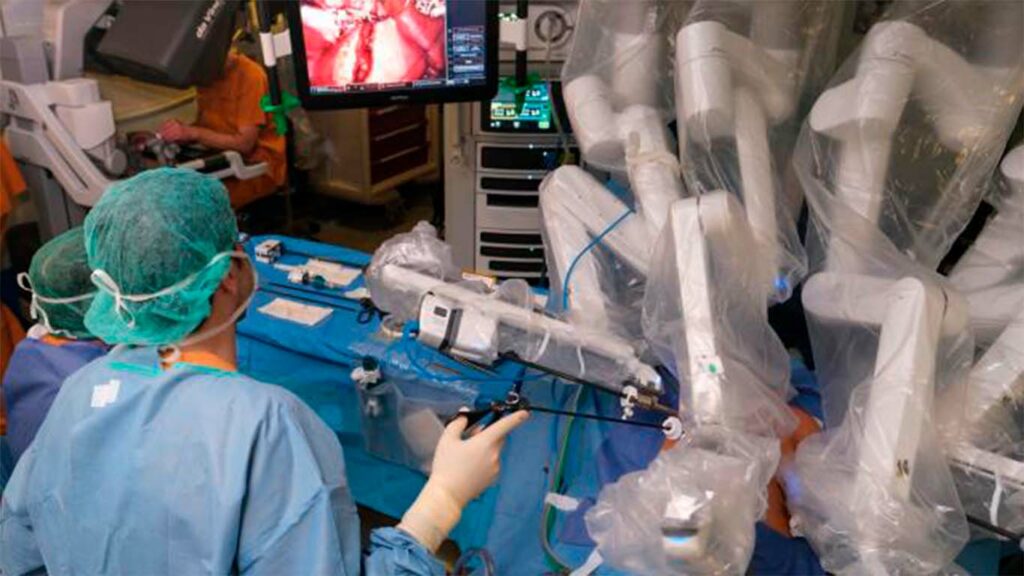The vast majority of human papillomavirus (HPV) infections do not cause any health problems, but for women who cannot fight the viral infection, HPV may cause cervical cancer. Specifically, each year around 2,000 cases are diagnosed in Spain, and worldwide this type of cancer represents the fourth leading cause of death from malignant tumors in women.
One of the options for this early-stage gynecological cancer treatment is radical hysterectomy. To collect evidence, data from 239 radical robotic hysterectomies carried out on the peninsula between 2009 and 2018 with the Da Vinci system have been collected in a single national registry, maintained by the ROBOCER research group.
Dr. Jordi Ponce, head of the surgery and robotics innovation line at IDIBELL and head of the Gynecology Service of the Bellvitge University Hospital (HUB), has led this multicenter group study that has had the participation of teams from hospitals of the state: Vall d’Hebron Hospital, Virgen del Rocío University Hospital (Seville), San Carlos Clinical Hospital (Madrid) and Basurto University Hospital (Bilbao), among others.
Evidence from a decade of records
From the data recorded by ROBOCER, two scientific articles have been published in the journal Cancers.
In the first article, from November 2020, the recurrence factors of cervical cancer after surgery were determined, which represented just under 10% of cases: grade 2 and 3 tumors, with a size bigger than 20 mm, adenocarcinoma type, among other usual features related to diagnostic tests.
In February 2022, the group’s second article was published in Cancers, whose objective was to identify the factors that influence oncological results according to the different clinical practices between hospital centers.
In conclusion, the hospitals with the best oncological results are associated with those with a greater volume of robotic surgeries. But also, a greater number of preoperative tests, sentinel node biopsies, and greater participation in clinical trials. Specifically, the HUB is the hospital that performs the most robotic hysterectomies in Spain, contributing many cases to the national registry.
The oncological and surgical results of radical robotic hysterectomies have been audited. The study has determined that in our setting, robotic surgery use makes it possible to achieve the quality objectives proposed by the European Society of Gynecological Oncology (ESGO).
“Robotic surgery has been established as a standard and precise way of operating, compared to other procedures such as laparoscopy and, of course, the traditional open approach”, values Dr. Ponce, who adds: “the study of the national ROBOCER registry shows good results for the management of cervical cancer. Now we hope to be able to conclude the ROBOEND registry of data on robotic surgeries in the last five years for the treatment of endometrial cancer in Spain and Portugal”.
The recent incorporation of a third Da Vinci robot in the HUB surgical block will make it possible to further increase robotic activity in Gynecology in our center.
In addition, the Gynecology Service of the Bellvitge University Hospital has been re-accredited by ESGO as a center of excellence, trainer of the European subspecialty of Gynecology Oncology in a rigorous program of fellows with degrees recognized throughout Europe.
The Bellvitge Biomedical Research Institute (IDIBELL) is a biomedical research center created in 2004. It is participated by the Bellvitge University Hospital and the Viladecans Hospital of the Catalan Institute of Health, the Catalan Institute of Oncology, the University of Barcelona and the City Council of L’Hospitalet de Llobregat.
IDIBELL is a member of the Campus of International Excellence of the University of Barcelona HUBc and is part of the CERCA institution of the Generalitat de Catalunya. In 2009 it became one of the first five Spanish research centers accredited as a health research institute by the Carlos III Health Institute. In addition, it is part of the “HR Excellence in Research” program of the European Union and is a member of EATRIS and REGIC. Since 2018, IDIBELL has been an Accredited Center of the AECC Scientific Foundation (FCAECC).

